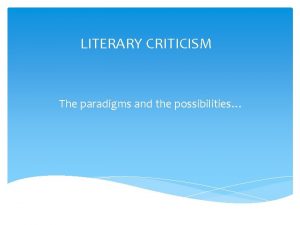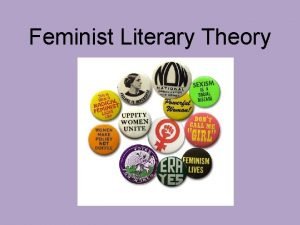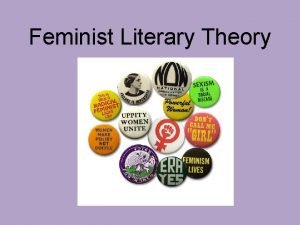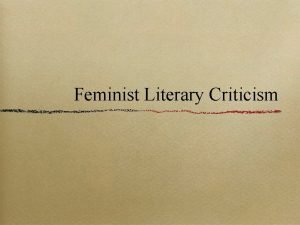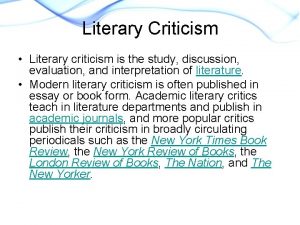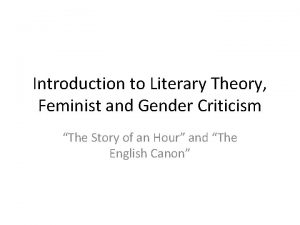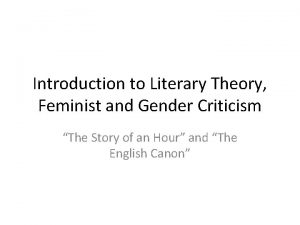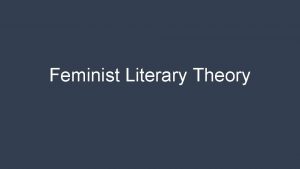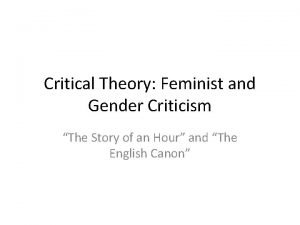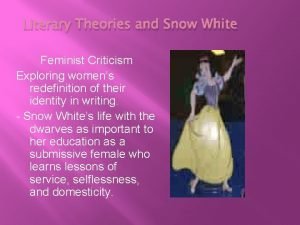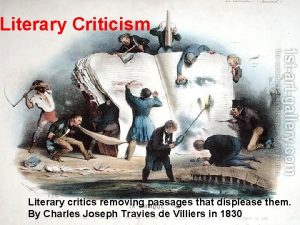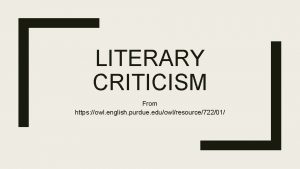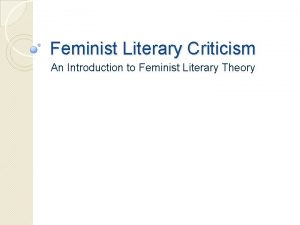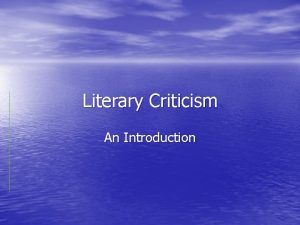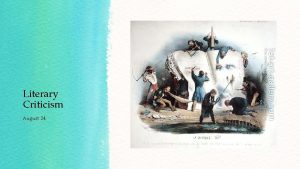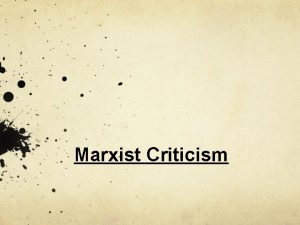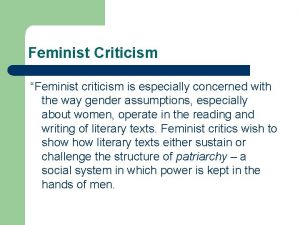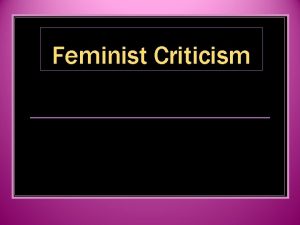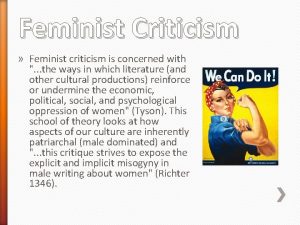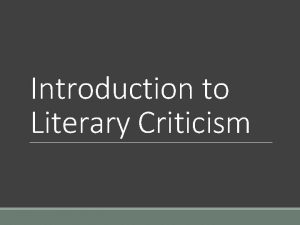Introduction to Literary Theory Feminist and Gender Criticism











- Slides: 11

Introduction to Literary Theory, Feminist and Gender Criticism “The Story of an Hour” and “The English Canon”

What do Literary Critics do? • Literary critics make observations about and connections between works of literature. • A literary critic might… – Explain how a certain literary effect is achieved using examples from a work of literature. – Explore how a work (or an author, or a group of authors) treats a theme. – Explore a work in the context of another academic discipline.

What do Literary critics not do? • Most literary critics are not interested in making judgments about whether a work of literature is “well written” or “poorly written. ” If a literary critic is writing about a work, he or she most likely believes that there is something interesting and worthwhile to say about it. • Most literary critics are not interested in making moral judgments about a work of literature. They are usually not concerned about whether a book is morally “bad” or “good, ” and they don’t write about the work in terms of “agreeing” or “disagreeing” with it.

What is “Critical Theory”? • A Critical Theory is like a set of “lenses” that literary critics put on in order to bring certain elements of the work into focus. As is true with real lenses, every critical "lens" will make the work "look" a little bit different. • Every critical theory has a set of assumptions about what is most important to look at in a work of literature. By "trying on" these assumptions for yourself, you can broaden your appreciation for the work, and for the critical theory or strategy.

Our First Theory: Gender Studies and Feminist Criticism • Many Gender Critics see a difference between gender (which is socially constructed) and sex (which is biological). • This means that ideas about "typically" masculine or feminine traits and behaviors are products of culture and social conditioning. • Gender Critics are interested in how works of literature either support or undermine the "standards" of masculine/feminine behavior and identity held by the culture in which they were produced.

A (Not So) Brief Note on the "Literary Canon" • Definition of “Canon: ” Originally, the term "canon" applied to the books of the Bible that were accepted as "divinely inspired. " (The word "canon" comes from a Greek word meaning "rule" or "measure. ") Therefore, the group of books that was accepted at any given time was referred to as the "canon of scripture, " and books outside of that canon were referred to as "non-canonical. "

A (Not So) Brief Note on the "Literary Canon“ (cont. ) The idea of the "Literary Canon" says that over time, teachers, academics, writers, and public opinion have, consciously or unconsciously, chosen works that are considered "worthy" of study. This also means that there must be other works that are not "worthy" of study. (Please note that there was never an actual list of works in the literary canon, and works have risen and fallen in status over time. ) For much of history, the "literary canon" in Western literature (used broadly to mean literature of places that have their foundation in Greek and Latin cultures… meaning Europe and most of the Americas post. Columbus) has been written by white men.

Now, back to Feminist and Gender Criticism • Feminist Critics and Gender Critics have many interests in common, but Feminist Critics are more likely to be interested in literary representations of women, and in bringing attention to works by women that have historically been overlooked, while gender critics are interested in the way that both the male and female genders are presented. • Feminist Critics believe that for much of history, the "literary canon" and the field of literary criticism have both been dominated by men, and the seek to expose the effects of this patriarchal mindset. • By looking at the ways that women's concerns and women's writing has been marginalized, they seek to address the imbalance that has traditionally persisted in favor of men's writing and men's concerns.

Questions for "The English Canon" • Refer to "The English Canon" by Adrienne Su on p. 724. • What is the concern that the speaker of this poem is expressing? Support your ideas with lines from the text. • How does this poem speak to some of the ideas in Feminist and Gender Criticism that we have been talking about? What do you think a Feminist or Gender Critic would say about this poem? • (Remember, to put it very simply, Gender Critics are interested in culturally produced ideas about what is "masculine" and "feminine. " Feminist Critics are interested in how living in a society and reading a literature dominated by men affects women, and by extension, society as a whole. )

Questions for “Story of an Hour” p. 106 • Using evidence from the text, describe the Mallard marriage. • What is the irony of this story? • Do you think that this story is critical of marriage as an institution? Why or why not? • What can the critical lens of feminist/gender criticism help us to make of this story? (How does it either support or undermine gender roles? In what ways does it comment on women’s issues? )

In Class Writing #4 • Earlier in the semester, we read some “shorts” the presented a “complete” story in a very compressed space. • For this in class writing, I would like to you write a “short” (no more than 500 words) of your own that deals with one of themes we have discussed this week. (I will allow you to take it home and polish it. ) • If you’re having a hard time getting started… – Start by making a list of “acceptable, ” “proper” masculine/feminine behaviors. – What are the consequences, good and bad, for a character who either accepts or challenges these behaviors and expectations?
 Reader response criticism
Reader response criticism Feminist criticism
Feminist criticism Gender criticism in literature
Gender criticism in literature Feminist literary criticism ppt
Feminist literary criticism ppt Feminist literary approach
Feminist literary approach Gender criticism in literature
Gender criticism in literature Feminist criticism in the story of an hour
Feminist criticism in the story of an hour Feminist criticism questions
Feminist criticism questions Feminist criticism in the story of an hour
Feminist criticism in the story of an hour Feminism in snow white
Feminism in snow white Archetypal criticism questions
Archetypal criticism questions Ecocriticism purdue owl
Ecocriticism purdue owl
